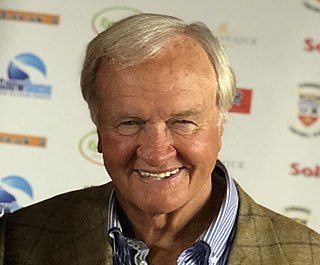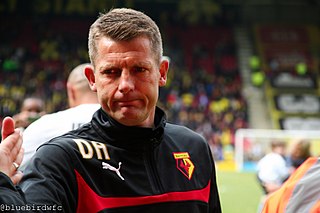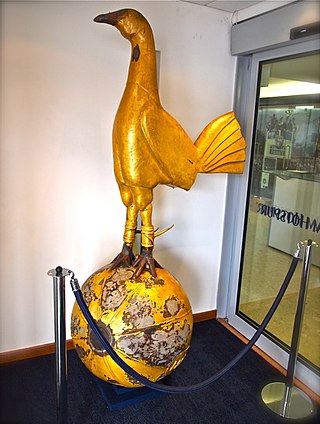Related Research Articles

Osvaldo César Ardiles, often referred to in Britain as Ossie Ardiles, is an Argentine football manager, pundit and former midfielder who won the 1978 FIFA World Cup as part of the Argentina national team.

Tottenham Hotspur Football Club, commonly referred to as simply Tottenham or Spurs, is a professional football club based in Tottenham, London, England. It competes in the Premier League, the top flight of English football. The team has played its home matches in the 62,850-capacity Tottenham Hotspur Stadium since April 2019, replacing their former home of White Hart Lane, which had been demolished to make way for the new stadium on the same site.

Christopher Roland Waddle is an English former professional football player and manager. He had a spell as Burnley manager during the 1997–98 season, but has not returned to coaching since. Largely since retiring he has worked in the media for BBC Radio 5 Live as part of their Premier League and Champions League team. He currently works as a commentator.

Sheffield Wednesday Football Club is a professional association football club based in Sheffield, South Yorkshire, England. They compete in the EFL Championship, the second level of the English football league system.

Barnet Football Club is a professional association football club based in London Borough of Harrow, North West London. The team compete in the National League, the fifth level of the English football league system. The club was founded in Chipping Barnet in 1888. From 1907 until 2013 they played their home matches at Underhill Stadium, then moved to the new Hive Stadium, which is named based on the club's nickname of "The Bees". The women's team, the London Bees, compete in the FA Women's National League.

Ronald Frederick Atkinson is an English former football player and manager. Nicknamed "Big Ron", he was regarded as one of Britain's best-known football pundits in the 1990s and early 2000s.

Martin James Allen is an English football manager and former player. He played more than 100 games as a midfielder for both Queens Park Rangers and West Ham United before finishing his playing career with Portsmouth and Southend United. Five years later, he took his first job in management, at non-league Barnet. He has since managed Brentford, Milton Keynes Dons, Leicester City, Cheltenham Town and Notts County. He rejoined Barnet as manager on 16 April 2012 on a short-term, three-match contract succeeding Lawrie Sanchez. In July 2012 he became manager of Gillingham and in the 2012–13 season led the team to the Football League Two title, earning Allen his first promotion as a manager and Gillingham's first divisional title in 49 years. He was sacked as Gillingham manager in October 2013. Allen rejoined Barnet for a fourth spell in 2014, leading the Bees back into League Two before dropping divisions to join Eastleigh in December 2016, a role he held only until the following February.
Harry Keith Burkinshaw is an English former professional footballer and football manager. He is one of the most successful managers of Tottenham Hotspur, winning three major trophies for the club as manager there.
Gary Christopher Phillips is a footballer coach and former player who played as a goalkeeper. He is academy head of goalkeeping at Watford.
Robert Anthony Kelly is a former English footballer and manager.

The history of Sheffield Wednesday F.C., an English football club from Sheffield, dates back to the club's establishment in 1867. The club would see early regional success followed by a rocky transition to professionalism. Although it has spent the majority of its Football League years in the top flight, its position within the league has varied from the very top to almost slipping to the fourth tier.
Douglas Ernest Livermore is a former professional football player and manager.
Ian Michael Hendon is an English football manager and former player who played as a defender.
Mark Robson is an English former footballer and former joint head coach of Barnet. He is currently a first team coach for West Ham United. Robson is particularly known for his association with Charlton having spent four years there as a player and eight as a coach.
Dean Brennan is an Irish football manager, who is head coach of National League club Barnet.

Dean Barry Austin is an English football manager and former professional player who is currently head of recruitment at Coventry City.
Keith Waldon is a physiotherapist and sports coach, who was assistant manager of Portsmouth F.C. under Terry Fenwick, and who acted as caretaker manager of the club in January 1998 after Fenwick's dismissal.
The 1999–2000 season was Sheffield Wednesday's 133rd season in existence. They competed in the twenty-team Premier League, the top tier of English football. The club finished nineteenth and were relegated from the Premier League for the first time.
David John Pleat is an English football player turned manager, and sports commentator. Pleat made 185 Football League appearances for five clubs, scoring 26 goals. He had two spells as manager of Luton Town, and four as manager of Tottenham Hotspur.

Tottenham Hotspur Football Club is a football club based in Tottenham, north London, England. Formed in 1882 as "Hotspur Football Club" by a group of schoolboys, it was renamed to "Tottenham Hotspur Football Club" in 1884, and is commonly referred to as "Tottenham" or "Spurs". Initially amateur, the club turned professional in 1895. Spurs won the FA Cup in 1901, becoming the first, and so far only non-League club to do so since the formation of the Football League. The club has won the FA Cup a further seven times, the Football League twice, the League Cup four times, the UEFA Cup twice and the UEFA Cup Winners' Cup in 1963, the first UEFA competition won by an English team. In 1960–61, Tottenham became the first team to complete The Double in the 20th century.
References
- ↑ Captain Atherton's band of hopefuls. Findarticles.com. Retrieved on 8 February 2013.
- ↑ Shreeves named manager of the month. BBC News (3 April 2001). Retrieved on 8 February 2013.
- ↑ Shreeves quits Wednesday. BBC News (17 October 2001). Retrieved on 8 February 2013.
- ↑ Barnet unveil Shreeves. BBC News (26 February 2002). Retrieved on 8 February 2013.
- ↑ Shreeves lands award. BBC News (3 April 2002). Retrieved on 8 February 2013.
- ↑ Shreeves quits Barnet. BBC News (18 March 2003). Retrieved on 8 February 2013.
- ↑ Press release from Grays Athletic board Archived 1 October 2011 at the Wayback Machine
- ↑ "Shreeves to lead Grays at Rushden". BBC Sport. 10 September 2009. Retrieved 10 September 2009.
- ↑ Barnet bring in Shreeves as coach. BBC News (26 January 2010). Retrieved on 8 February 2013.
- ↑ Shreeves is Honorary President of SA Stainash FC. "HENDON'S CONTRACT TERMINATED". Archived from the original on 1 May 2010. Retrieved 30 April 2010.. barnetfc.com (28 April 2010)
- ↑ Cloake & Powley (2008). The Boys from White Hart Lane. p. 210. ISBN 978-1-905326-38-9.
- ↑ "Woman hurled cement at neighbours in bitter feud". BBC News. 3 February 2023. Retrieved 11 November 2023.